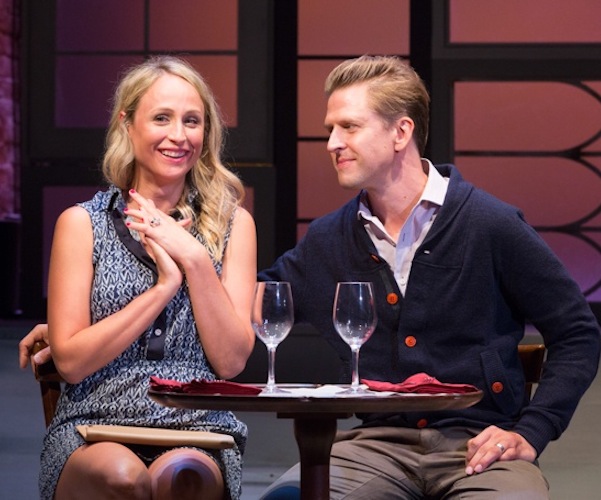Theater Review: “Laugh It Up, Stare it Down” — No Sex Please, We’re American
From the opening moment of this show, suspension of disbelief flies out the window and never returns.
Laugh it Up, Stare it Down by Alan Hruska. Directed by Chris Eigeman, At the Cherry Lane Theatre, 38 Commerce Street, New York, through October 10.

Katya Campbell and Jayce Bartok in a scene from “Laugh it Up, Stare it Down.” Photo: Richard Termine.
By Paul Dervis
The Cherry Lane Theatre is a New York institution. Over the past ninety some odd years it has hosted premieres of scripts by such theatrical luminaries as Eugene O’Neill, Clifford Odets, Harold Pinter, and David Mamet, just to name a few.
Playwright Alan Hruska does not belong in this acclaimed company …and his new play, Laugh it Up, Stare it Down certainly does not belong on the same stage.
From the opening moment of this show, suspension of disbelief flies out the window and never returns.
A young man named Joe sits on a stoop in the streets of the city. A young woman named Cleo passes by. He hits on her: ninety nine out of a hundred women would keep on walking, but Cleo stops. Seems that his none-too-clever quips interest her, although for the life of me I don’t know why. He poses the concept of their future together and, though she has a boyfriend, somehow this drip captures her imagination.
Flash forward two weeks. No more boyfriend, no talk of what happened to him. She just plops herself down on his single bed in his studio apartment and succumbs to his…uhum…charms. He has no money, no prospects, and no vision of his future.
Next scene: a couple of months later. In a restaurant with only one item on the menu and no customers, she tells him she is pregnant…he is overjoyed.
You get the point.
An hour later, they have played out the majority of their life experiences together, complete with infidelities, rags-to-riches journey, and natural disasters. Through it all thrives a love that will not die (damn it!) and characterizations that never develop.
If this sounds like a cheap imitation of a cheesy 1960s sex farce, (the woman sitting next to me suggested Love, American Style) you get the idea. But at least in those narratives there’s a semblance of dialogue, i.e. conversation between characters. Here, there is merely a sense that these trite people love to hear themselves talk. If they were actually witty then maybe, just maybe, Hruska’s characters could get away with it. But Noel Coward, along with any connection to reality, flew out of the window early on. Instead, we are offered two remarkably dull people who, come to think of it, deserve each other.
Hruska, who practiced law for forty years, has written a number of plays. But he was clearly influenced by the Doris Day/Rock Hudson vehicles of his youth, and it shows — painfully. This piece belongs in a time capsule. Frankly, the dramatist should spend less time writing and more time listening to random conversations. He needs to absorb how people actually talk to each other…that quality is woefully missing here.
And the cast does not help.
Jayce Bartok as Joe, has performed on many respected stages, such as Circle Rep. But here he fails to drum up any appeal in a man that we are led to believe is loaded with it. His performance is paper-thin and borders on being stuck in monotone. The same can be said for his partner in crime, Katya Campbell as Cleo. Instead of sparkling, they simply drone on and on and…
But what could they do with the hapless dialogue? I can’t answer that question.
Kevin Judge’s set could have been lifted off the stage of a local “Little Theatre” near you, while Chris Eigeman’s direction graduated from the ‘faster, louder, funnier’ school of mismanagement. And I guess that’s a godsend.
At least the show moves along quickly.
Paul Dervis has been teaching drama in Canada at Algonquin College as well as the theatre conservatory Ottawa School of Speech & Drama for the past 15 years. Previously he ran theatre companies in Boston, New York, and Montreal. He has directed over 150 stage productions, receiving two dozen awards for his work. Paul has also directed six films, the most recent being 2011’s The Righteous Tithe.
Tagged: Alan Hruska, Cherry Lane Theatre, Laugh it Up Stare it Down, Paul Dervis
